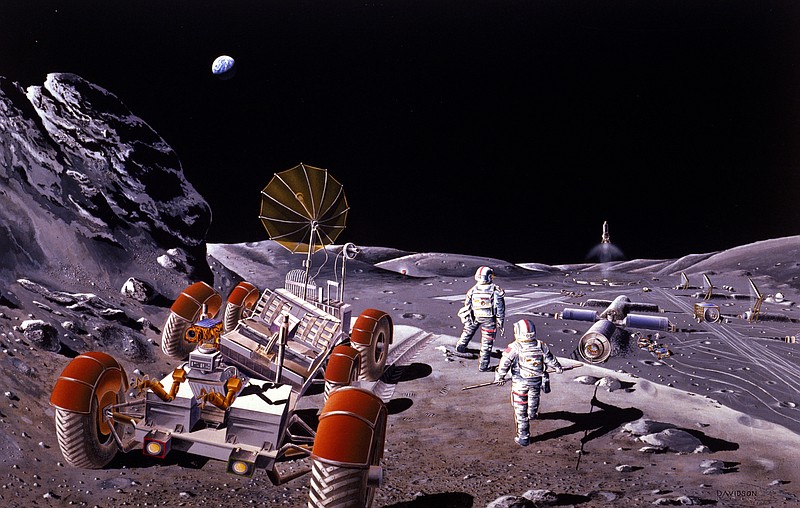More Info
WayPaver University will launch on Nov. 5 with a five-week course titled Navigating To Tomorrow: An Introduction to Future Studies” that will cover emerging technologies and future trends. The course is free and open to the public, but space is limited.
The Lamp Post Group has helped fund some intriguing businesses, from the moving and lifting company Bellhops to video production startups Mama Bear Studios and Fancy Rhino.
Now the downtown Chattanooga business incubator hopes to take things to a much higher level - really shooting for the stars. They want to put a human colony on the moon.
"We're launching The Lunar Project, a serious effort to establish a settlement on the moon within the next two decades," says the website for WayPaver Labs, a nonprofit organization at the Lamp Post Group's hip, loft-style offices in the historic Loveman's Building, Chattanooga's former flagship department store at Market and Eighth streets.
WayPaver Labs isn't Mission Control in Houston, which the public became familiar with during the moon shots' heyday. It only has three full-time employees and one part-timer - not an army of technicians sporting crew cuts, white dress shirts, ties and pocket protectors.
And Chattanooga doesn't have the space exploration history of say, Huntsville, Ala., home of the Marshall Space Flight Center, where NASA developed the rockets that put man on the moon.
But WayPaver Labs' people say they are serious about their mission.
They plan to bring together experts and act as a clearinghouse for information about lunar living, which they say technology has made more feasible than ever. And innovations required to make the moon livable, such as providing breathable air and drinkable water, could have big payoffs, they say, for an increasingly crowded Earth.
"Technology is changing more rapidly today than at any point in history," said Ted Alling, a partner at Lamp Post Group. "So when you think 20 years down the road, life on the moon is plausible. Most importantly, in the process of pursuing lunar colonization, many technologies capable of improving life on Earth will emerge."
Patrick Gray, WayPaver Labs' director of lunar programs, said technology has advanced to the point where a large satellite that once cost the U.S. Department of Defense $1 billion can now be replicated in a foot-long satellite that costs about $300,000.
A 3-D printer could be sent to the moon to build solar panels out of raw material there to power a lunar settlement, he said, before astronauts arrive.
The moon has a lot of water on it, Gray said, that could be tapped by a colony - or used as fuel for a Mars-bound space ship.
"To me, the moon is very much a stepping stone to Mars," said Gray, who moved to Chattanooga from the San Francisco Bay area. "The commercial push for the space industry is really picking up steam."
WayPaver Labs' managing director Nick Arnett also moved here from the Bay Area, where he worked for Peter Thiel, the billionaire Silicon Valley investor who co-founded PayPal and was Facebook's first outside investor.
Skeptical? Arnett recognizes that.
"We face a huge mountain to climb here at WayPaver in getting the public to believe in space settlement," he said.
That's one reason why WayPaver Labs this fall will launch WayPaver University. It will offer "in-depth courses on everything from artificial intelligence to the future of humanity in space."
WayPaver Labs also plans to establish an "accelerator for interplanetary living" next year to attract researchers to develop the new technologies required to make life on the moon self-sufficient without resupply from Earth.
"Teams accepted into the accelerator will receive seed funding, office space, HR and accounting support, PR and marketing support, access to a world-class group of mentors and advisors, as well as access to our Lunar Research Park in Chattanooga for development and testing," WayPaver's website says.
"We've already had a very warm reception from the space community," Arnett said. "Some people that have never even heard of Chattanooga before are now excited to come visit."
Alling is the former CEO and a co-founder of Access America, a transportation and logistics company that was one of Chattanooga's most successful start-ups with sales estimated at $600 million when it was sold in April 2014 to Coyote Logistics. Coyote acquired Access America for $125 million, according to the group Startup Angels. Then UPS this summer spent $1.8 billion to buy Coyote Logistics.
So the Lamp Post Group, which has about 20 start-up businesses in its portfolio, has money to invest. It's committed $500,000 to date, Alling said, to WayPaver Labs.
"We're serious about Chattanooga being a place where young entrepreneurs are fearless to ask big questions," Alling said. "Ten years ago, it would have seemed ludicrous that a mass-produced electric car would be faster than a Corvette or that people would be 3-D printing entire homes, but that's where we are in 2015."
Contact staff writer Tim Omarzu at tomarzu@timesfreepress.com or www.facebook.com/MeetsForBusiness or twitter.com/meetfor business or 423-757-6651.


